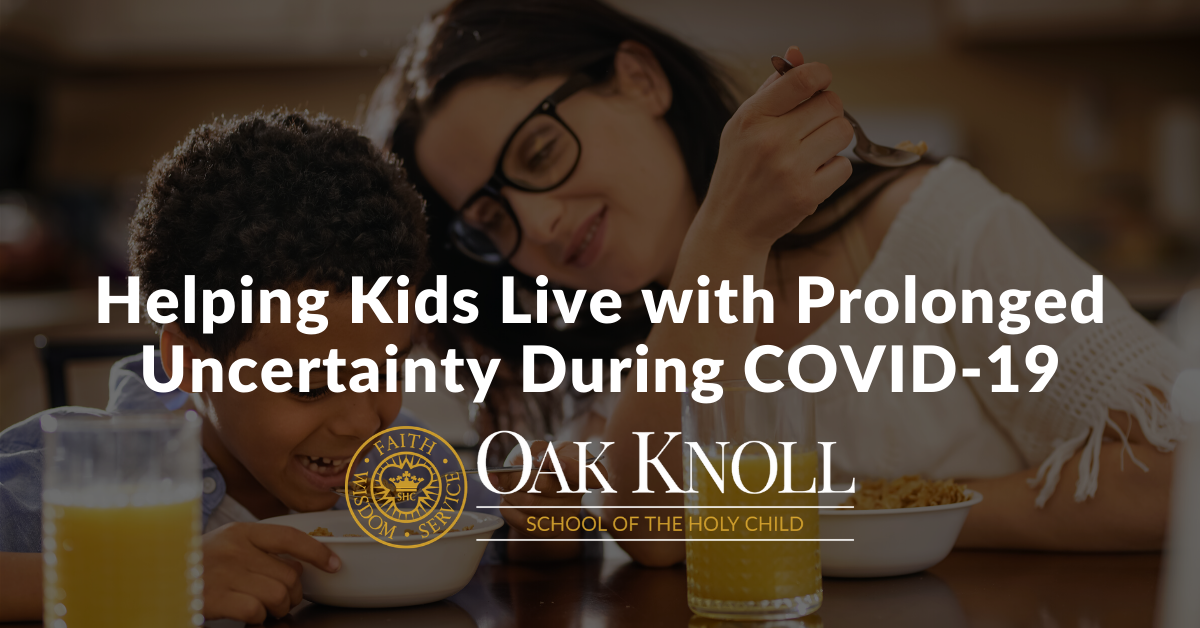Since COVID-19 began to spread across the globe and states began to mandate stay-at-home orders, the light at the end of the tunnel has become clouded for many. Although some questions have been answered by state and local health officials over the past few months, some things – such as when students can return to classes and sports – are still up-in-the-air.

So, if adults and experts are still scrambling to figure out the new normal amid this global pandemic, how are our children processing the day-to-day changes and the many uncertainties that lie ahead?
As parents, teachers and administrators, it’s our job to help our children navigate the prolonged uncertainty during COVID-19.
Here are some tips:
Talk it Out
Children naturally tend to ask many questions so it’s especially important during this pandemic to listen to their questions and answer as you feel appropriate. Each parent and family will have different approaches when it comes to talking to their children – based on their age – about what’s happening. It’s a good idea to reassure your children that you are taking steps to keep them safe, such as washing hands frequently, staying home more, remaining away from big groups and by wearing a mask in public. While we all will have bad days – which is normal – when your children see your calm demeanor, they will follow your lead.
Implement and Stick to Familiar Routines
Over the course of a child’s life, parents usually hear from their pediatrician to develop a daily routine. Routines tend to allow children of all ages to feel safe and in charge of their days and help with transitions, which sometimes can be a source of panic for some. Some routines to stick with include getting your child up around the same time you normally do as if in school, implementing regular bedtimes, dinnertimes as well as ample down and family time.
Watch for Warning Signs of Anxiety & Stress
During this lengthy time of unanswered questions, it’s normal for children to demonstrate anxiety and stress. However, many children, unlike adults, tend to manifest stress in different ways. For example, children may say they’re moody because they have too much work to handle or they’re bored. The underlying issue, however, may be rooted deeper and it’s important as parents to keep digging. Maybe they caught a glimpse of the news and became nervous. Let your child know that you are there when they’re ready to talk or try to lighten the mood by playing a game, taking a bike ride, cooking, taking a drive or facetiming with a loved one. Watch out also for too much screen time. Children are already dealing with more online classes and “Zoom fatigue,” so adding on too much Fortnight time to their day may cause unnecessary irritably and agitation.
Don’t Think of What You Can’t Do, Think About What You Can Do
Parents should try to counteract the negativity their children are feeling because of COVID-19. Yes, schools, most sports and social gatherings are closed, but start switching your attitude to look on the bright side. Your child’s favorite restaurants most likely offer curbside pickup, friends can gather in groups of up to 25 if they’re outdoors and plans are beginning to unroll for summer graduations. Although children may be mourning what they don’t have, try to reassure them of the good they have during this time.
Although the distant future remains in a state of flux now, the most important thing your child can learn from this experience is that they are safe and that you as their parents are always on their side!




